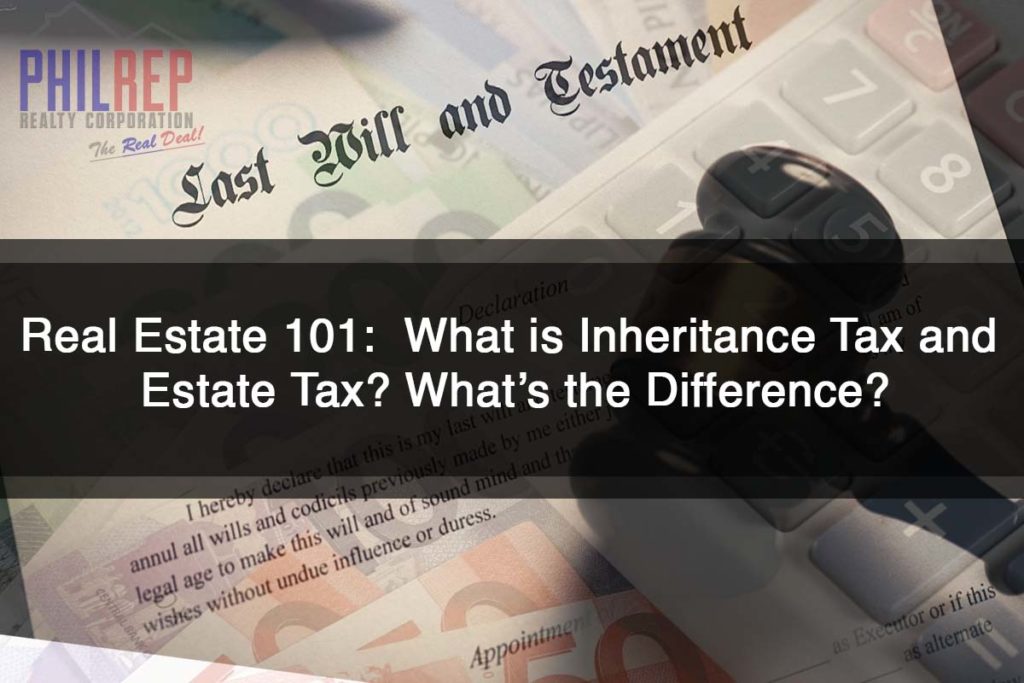
Real Estate 101: What is Inheritance Tax and Estate Tax? What’s the Difference?
There’s an old saying that’s been used countless times in movies and TV. The line goes something like, “There are two things you cannot escape in life: Death and Taxes”. In some countries, this is even referred to (colloquially) as “Death Taxes”. Definitely dark humor, but in reality, it has a ring of truth to it.
A large number of people work very hard to secure a good future for their loved ones and provide for all their needs. They may also hope to leave some kind of lasting legacy when the inevitable end comes. It can take many forms such as real estate, money, personal belongings of value (e.g. family heirlooms, jewelry, paintings, cars), or various assets that can be passed on to loved ones. This is all fine and good. Until the time comes for the lawful heirs to come claim their inheritance. This is when taxes rear their ugly head (as if the passing of a loved one wasn’t hard enough).
Anyone who has inherited something from someone who passed away by way of being included in a will may be required to pay inheritance tax. But before we can proceed, we need to define first what is meant by “estate”. Someone’s estate can include property, as well as everything else of value the deceased party owned at the time of death.
Inheritance Tax vs Estate Tax
Simply put, inheritance tax is a tax imposed by the government on the beneficiary of the inheritance (i.e. The person(s) receiving the asset or estate). This is in no way tax levied on the property itself, but rather, it is a tax on the transmission (or turn-over) of the estate of the deceased to one or more heirs. One of the most common questions that arise is “who pays the inheritance tax?”. Some countries put the sole responsibility of paying the inheritance tax on the lawful heirs, while the estate tax is paid out from the estate’s funds. However, in the Philippines, they are one and the same. From this point forward, we will be using Inheritance Tax and Estate Tax interchangeably since they really mean the same thing under Philippine law.
For example, if several beneficiaries are the recipient of a particular property (let’s say an office building), inheritance or estate tax will be computed for each beneficiary. This means that each beneficiary is responsible for paying for their own tax.
The estate tax return must be filed with the Bureau of Internal Revenue (BIR) if the gross value of the estate (consisting of registered property, vehicles, shares of stock, jewelry, money, etc.) has a gross value of more than Php200,000. That being said, it may actually make more sense to distribute inheritance before the time of death (which can sometimes be tricky, because death doesn’t abide by anyone’s schedule)
Non-resident inheritance tax
If any of the heirs are non-residents (i.e. migrate to another country), they also need to file an estate tax return. If the executor of the will lives in the Philippines, the estate tax return can be filed with an authorized agent bank of the specific Revenue District Office (RDO) where the executor lives. However, in case there is no executor in the Philippines, for example if the deceased was not a Philippine resident, then the tax return should be filed under the jurisdiction of RDO No. 39 South Quezon City.
How is inheritance tax computed?
So now we delve into the computation of the inheritance tax. The inheritance tax is computed against the net value of the assets included in the estate. The net value is sometimes referred to as the “gross estate”, which refers to all property including real property, personal property, tangible property (such as bonds or shares of stock), or intangible property (such as patents, trademarks or copyrights). Also. This is computed using the Fair Market Value (FMV) at the time of death. FMV is the reasonable price at which one could sell the estate to an interested buyer.
Since we already discussed non-resident inheritance tax, let’s also consider the possibility that the deceased wasn’t living in the Philippines (a non-resident, or not a Philippine citizen) at the time of death. Only the part of the gross estate that is situated in the Philippines is considered taxable.
This tax must be settled within six (6) months from the date of death before distribution of the inheritance to the beneficiaries can proceed. Otherwise, the beneficiaries may face penalties, unless an extension is granted by the commissioner. If you could prove to the commissioner that payment by the due date would impose undue hardship on the estate or any of the heirs, the due date could be extended up to 5 years if the case is settled through courts, and up to 2 years, if handled extrajudicially. In the Philippines, a graduated tax rate determines inheritance taxes. Estates with a net value of less than Php 200,000 are exempted from paying inheritance tax while those valued at a higher amount may be required to pay a tax rate of anywhere from 5% up to 20%. In general, late payments incur a 25% initial penalty and accrue 20% annual interest on the amount. If any fraud is involved, the amount leaps to 50%.
Is there any way to reduce the amount of inheritance tax?
This is another common question asked by beneficiaries of an estate. The most common method is to apply as many deductions on the inheritance tax as possible. This will lower the FMV of the estate, which can help put the value of the estate at a lower tax tier or threshold. It is always a good idea to examine which deductions can be applied to the estate. Below is a short list (i.e. not comprehensive) of deductions that might be applicable:
| Deduction | What is this? |
| ELIT (Expenses, Losses, Indebtedness, and Taxes) | Funeral expenses, other claims against the estate, judicial expenses of interstate proceedings, unpaid mortgages, claims of the deceased against insolvent individuals |
| Transfers for public use | The amount of all bequests, legacies, devises or transfers to or for the use of the Philippine Government, or any political subdivision thereof, for exclusively public purposes |
| Family Home | The lower number between the family home’s FMV or Php 1 million, and the family home must be certified by the barangay captain of the locality |
| Standard deduction | The amount of Php 1 million |
| Medical expenses | Expenses incurred by the deceased within a year prior to their death, which has to be supported with receipts, for a maximum deduction of Php 500,000. |
Estate Tax Amnesty
One of the most recent developments regarding tax amnesty at the time of this writing is the Tax Amnesty Act signed by President Rodrigo Duterte. This provides a 2-year period for taxpayers to settle estate tax obligations through a tax relief over properties with outstanding tax estate liabilities. The Tax Amnesty Act started on June 15, 2019, and will cover the unpaid estate taxes of any decedent who passed away on or before December 31, 2017.
Those with unsettled estate taxes starting from January 2018 to date can still benefit from the Estate Tax Amnesty through the amendments made under the TRAIN Law. It states that a tax rate of 6% will be imposed on the total net estate value of the decedent.
Useful Links:
Tax Amnesty Act – https://www.officialgazette.gov.ph/2019/02/14/republic-act-no-11213/
TRAIN Law – https://www.bir.gov.ph/index.php/train.html

we are two brothers who were orphaned by our father. he left a land named after him. He has been dead for 28 years. how much will we pay state tax so that my brother and I can sell the land we inherited.
Good day to all of you,
How to calculate inheritance tax.
We want the brothers and sisters to subdivide our farmland into ten siblings and we can apply for titling to each of our siblings’ names.
The total area of farmland is 38,000 square meters with a total market value of approximately 600,000.00
Our booth parent pass away last 1978
What are the procedures to avail of the inheritance amnesty tax?
Thanks, much, and God Bless you,
Best Regards,
Noel B. Dulguime
noeldhulls39@yahoo.com
Cp#09193171885